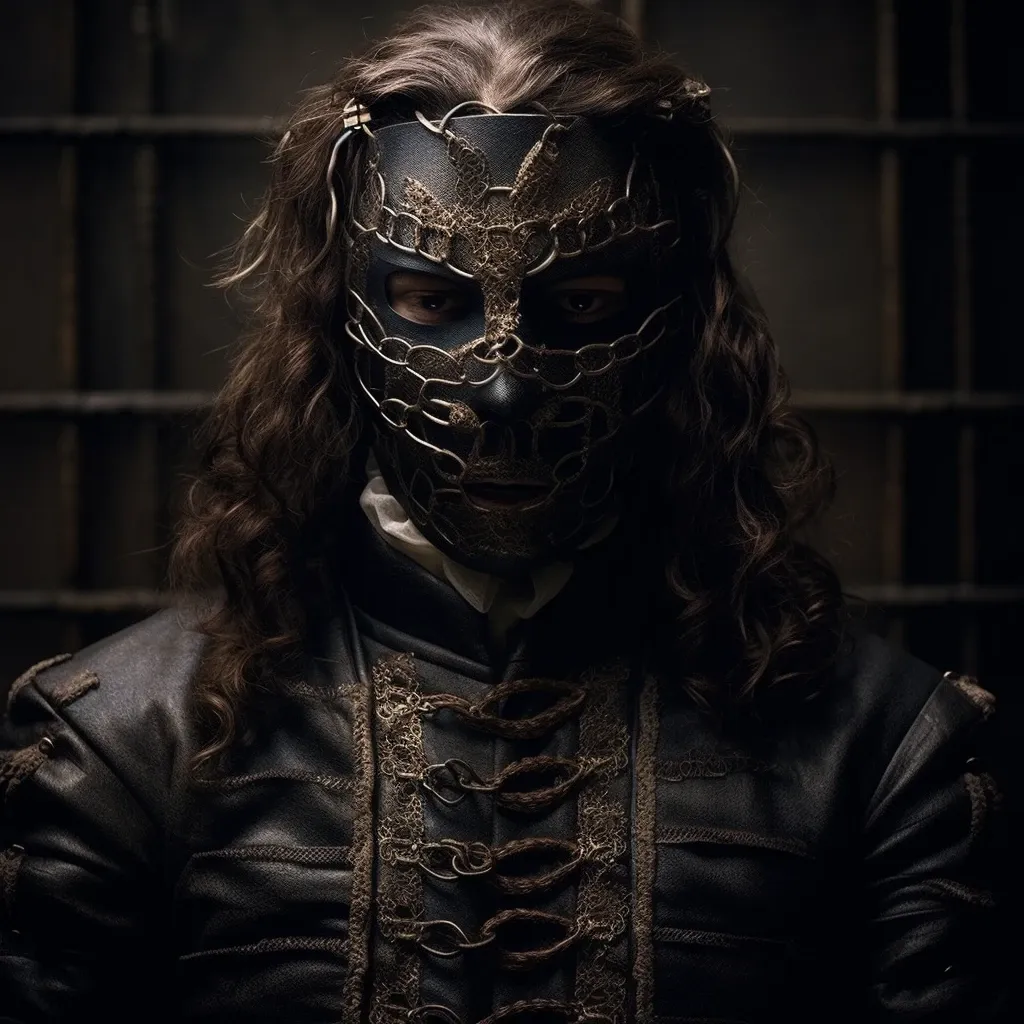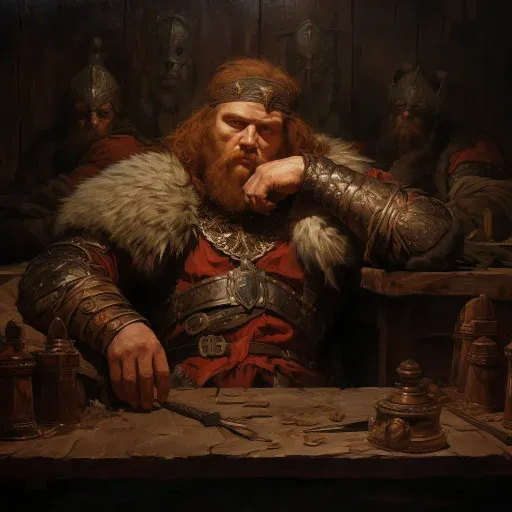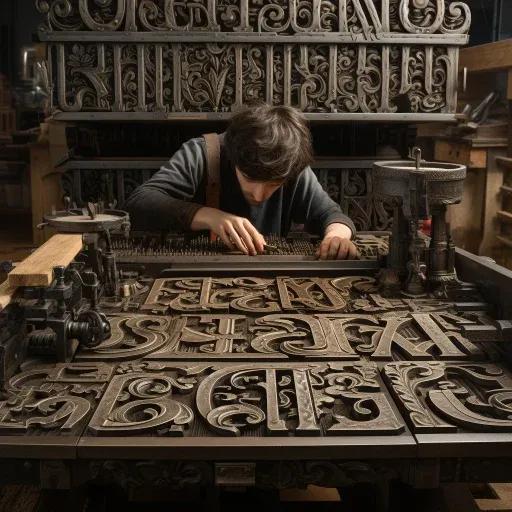BY JAMES BALDWIN
The Man in the Iron Mask
Famous Stories Retold: Story 21 of 30

Heading

Mysterious Identity: The Man in the Iron Mask was a prisoner during the reign of King Louis XIV of France. His identity remains a mystery, with speculations including that he was the king's cousin or twin brother.
Legacy of Secrecy: The story of the Man in the Iron Mask continues to intrigue historians and writers, as no one has definitively uncovered his true identity or the reasons for his imprisonment.
A good book we like, we explorers. That is our best amusement, and our best time killer
- Roald Amundsen, Explorer
The Iron Mask: History's Enigmatic Prisoner
A tale that has baffled historians for centuries, one shrouded in mystery and intrigue, centering around the enigma that is The Man in the Iron Mask. This compelling narrative, set in the era of grandeur and tyranny under Louis the Fourteenth, holds a captivation that refuses to wane. The enduring enigma of the masked prisoner's identity continues to fascinate, tease and perplex us. As we delve deeper into this captivating chronicle, we will attempt to decode the enduring riddle - who was the man behind the iron mask? Prepare to question everything you thought you knew about this famed historical conundrum.
The Grand Monarch and His Imprisoned Secret
In the zenith of his reign, King Louis the Fourteenth, also known as the Grand Monarch, held an imposing yet ominous secret. His grandeur and might were not only reflected in his luxurious palaces, but also in the grim prisons that housed those who fell out of favor. One such prison, a dreary castle on the Sainte Marguerite island, held a prisoner whose identity was shrouded in mystery. This prisoner, known only to the king and a select few, was the man in the iron mask. His face, concealed forever behind the iron visage, was kept hidden from the world, thus birthed one of history's most enduring enigmas.
The Mysterious Prisoner in the Iron Mask
The iron-masked prisoner who resided in the Sainte Marguerite castle was an enigma to the world outside. His face, always hidden behind the iron mask, was never revealed to anyone. He was seen only at the iron-barred window of his prison cell, where he often stood for hours looking out at the sea, or playing mournful tunes on his guitar. The mask he wore had openings for his eyes and a movable part for his mouth, but it was never removed, guarding his identity and adding layers to the mystery of his existence.
Dive Deeper 'Timeless Wisdom' Podcast
Video with Captions and Visualizer
Speculations and Guesses: The Identity of the Man in the Iron Mask
The identity of the man in the iron mask has been the cause of rampant speculation and conjecture over the centuries. Some rumors suggested that he was the king's rash cousin, while others believed that he was the king's own twin brother. Yet others theorized that he might be an exiled English prince. However, the truth was carefully guarded by the king and his trusted circle, leaving the world to guess and wonder. To this date, the true identity of the man in the iron mask remains a mystery, making his story one of the most intriguing unsolved puzzles of history.
The Silver Plate: A Silent Cry for Help
A peculiar incident occurred during the imprisonment of the Man in the Iron Mask, one that added a profound depth to the mystery surrounding him. One day, a local fisherman was presented with an unexpected gift from the sea. A bright, round object fell into his boat while he was rowing underneath the prison window. It was a silver plate, beautifully crafted and inscribed with words etched deep into the underside.
The prisoner, it was said, was served his meals in silver dishes. It was believed that he had managed to keep one of these plates concealed, using it as a canvas to write his history, his secrets, and perhaps, his true identity. He then cast it out of the window, hopeful that it would find its way into sympathetic hands. Alas, the fisherman could not read. The secrets etched into the plate remained untouched, and the prisoner's silent plea for help echoed unanswered.

The Dwindling Days: The Man in the Iron Mask's Final Years
As the years passed, the Man in the Iron Mask became an increasingly melancholic figure. His appearances at his prison window dwindled. The music from his guitar, once heard drifting mournfully across the sea, became less frequent and more sorrow-laden. The prisoner was slowly succumbing to the ravages of time, his spirit as much a captive as his body.
A doctor was brought in, tasked with trying to restore the prisoner's health. He later penned an account of his interactions with the mysterious figure, describing him as a man of fine appearance with a dark complexion and a pleasant voice. Yet, the prisoner's name, his past, and the reason for his imprisonment remained as elusive as ever.
An Enduring Enigma: The Lasting Mystery of the Man in the Iron Mask
After twenty-five years of confinement, the Man in the Iron Mask passed away, taking his secrets to the grave. His identity, his crimes, and his story remain an enigma that continues to fascinate and baffle historians and readers alike.
Even today, theories and speculations abound regarding the man's true identity. Was he a disgraced nobleman, a political dissident, or perhaps the king's own twin brother? The mystery of the Man in the Iron Mask has proven to be as enduring as the iron mask itself, a testament to the human fascination with the unknown and the unresolved. Whether his true story will ever be uncovered remains to be seen. For now, the Man in the Iron Mask remains a captivating symbol of intrigue and secrecy, a faceless figure forever cloaked in the shadow of history.
Conclusion
In our quest to unmask the mystery, we traversed through the life and times of the enigmatic prisoner, exploring speculations about his identity and the poignant tale of the silver plate. His final years and eventual demise, yet, left us with more questions than answers. The Man in the Iron Mask, remains, as much a mystery today as he was during the reign of Louis the Fourteenth. His story, a timeless emblem of intrigue, continues to bewitch our curiosity, reminding us that history often holds secrets, forever shrouded in silence and shadows.





